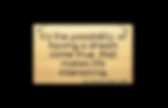

Soul of the World. Introduction to alchemy. What exactly is alchemy?
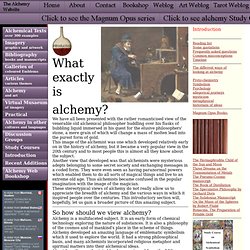
We have all been presented with the rather romanticised view of the venerable old alchemical philosopher huddling over his flasks of bubbling liquid immersed in his quest for the elusive philosophers' stone, a mere grain of which will change a mass of molten lead into the purest form of gold. This image of the alchemist was one which developed relatively early on in the history of alchemy, but it became a very popular view in the 20th century and to most people this is almost all they know about the subject. Another view that developed was that alchemists were mysterious adepts belonging to some secret society and exchanging messages in a coded form. They were even seen as having paranormal powers which enabled them to do all sorts of magical things and live to an extreme old age. The Alchemy Web Site. Alchemy. The Emerald Tablet, a key text of Western Alchemy, in a 17th-century edition Alchemy is an influential philosophical tradition whose practitioners have, from antiquity, claimed it to be the precursor to profound powers.
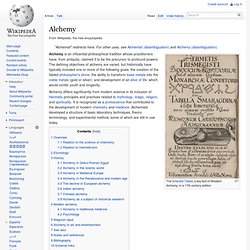
The defining objectives of alchemy are varied, but historically have typically included one or more of the following goals: the creation of the fabled philosopher's stone; the ability to transform base metals into the noble metals (gold or silver); and development of an elixir of life, which would confer youth and longevity. Overview[edit] The Great Art - Alchemy. The Nature and History and The Great Art of Alchemy Ed Reither University of New Orleans "The changing of bodies into light and light into bodies, is very comfortable to the course of nature, which seems delighted with transmutations.
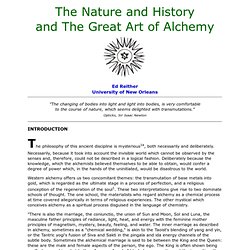
" Opticks, Sir Isaac Newton The philosophy of this ancient discipline is mysterious1a, both necessarily and deliberately. Necessarily, because it took into account the invisible world which cannot be observed by the senses and, therefore, could not be described in a logical fashion. Alchemy manuscript. Other copies of the Rosarium Philosophorum in Special Collections: MS Ferguson 6: German, 17th century, colour illustrations, one among several items.
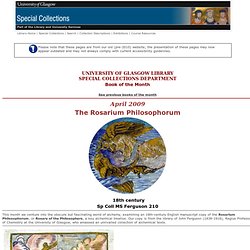
MS Ferguson 29: French, 16th century, 20 drawings, black and white. MS Ferguson 74: French, 16th century, 21 line drawings in pen and ink. MS Ferguson 96: Latin, 16th century, illustrations pasted from Frankfurt edition and coloured in. MS Ferguson 149: German, 16th century, 21 illustrations, most drawn in flasks. First book to contain the Rosarium (as part of a larger printed work): De alchimia opuscula complura veterum philosophorum Frankfurt: ex officina Cyriaci Iacobi. 1550: Sp Coll Ferguson Al-y.18 See also: Roger Bacon The Mirror of Alchemy, composed by the thrice-famous and learned fryer, Roger Bachon London: printed [by Thomas Creede] for Richard Oliue, 1597 Level 12 Sp Coll Ferguson Ag-e.26 De alchimia opuscula complura veterum philosophorum Francoforti: ex officina Cyriaci Iacobi, 1550 Level 12 Sp Coll Ferguson Al-y.18. Font - Symbols for Alchemical Processes. Alchimie Alchemy. Alchemy (Ars Regia) Alchemy.
Alchemy & The Philospher Stone. Modern Metallurgical Alchemy - ZP.tech. Alchemy al⋅che⋅my [al-kuh-mee] (www.dictionary.com) –noun, plural -mies for 2. 1- a form of chemistry and speculative philosophy practiced in the Middle Ages and the Renaissance and concerned principally with discovering methods for transmuting baser metals into gold and with finding a universal solvent and an elixir of life. 2- any magical power or process of transmuting a common substance, usually of little value, into a substance of great value.
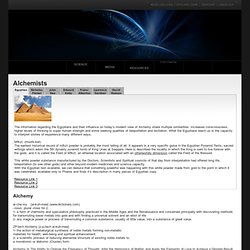
ZP.tech Alchemy [z-p-tech al-kuh-mee} 1- the action of metallurgical synthesis of noble metals forming non-metallic materials for health, well-being and spiritual enhancement. 2- a scientific process of reducing elemental structure of existing noble metals to a monatomic or diatomic (Cluster) form. ORMES. Qigong taiji classes. This vigorous Qigong is based on the ancient Taoist inner alchemy.
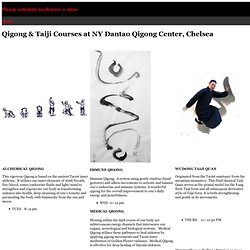
It utilizes our inner elements of wind/breath, fire/blood, water/endocrine fluids and light/mind to strengthen and regenerate our body in transforming sickness into health, deep cleansing of one’s toxicity and permeating the body with luminosity from the sun and moon. TUES. 8—9 pm Fee: $240/Series Please sign up to observe a class Immune Qigong: A system using gentle mudras (hand gestures) and silken movements to activate and balance one's endocrine and immune systems. WED. 11--12 pm Flowing within the dark recess of our body are subterranean energy channels that interweave our organs, neurological and biological systems. WED. 8—9 pm Originated from the Taoist sanctuary from the mountain monastery. Ongoing Classes: Rolling admission as space permits $ 100/Month (4 week month) $ 125/Month (5 week month) enrollment Registration: Qi Gong. Alchemy. The Alchemy of Time: Understanding the Great Year & the Cycles of Existence.
Jay Weidner, New DawnWaking Times.
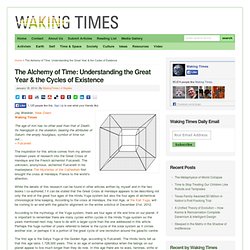
Spiritual Alchemy. Alchemy. Alchemy. THE SACRED ART Of ALCHEMY. Much to his astonishment, C.
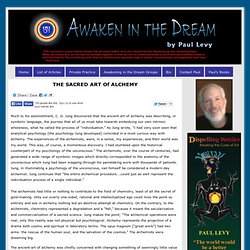
G. Jung discovered that the ancient art of alchemy was describing, in symbolic language, the journey that all of us must take towards embodying our own intrinsic wholeness, what he called the process of “individuation.” As Jung wrote, “I had very soon seen that analytical psychology [the psychology Jung developed] coincided in a most curious way with alchemy. The Alchemy Web Site.